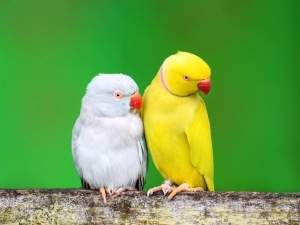
If a bird is injured, or distressed, the bird will try its best to mask the signs of injury and distress.
Birds have a natural instinct to cover up signs of illness or distress, they can be attacked by predators if they show these signs of weakness. However, some signs of illness and distress can’t be masked.
If your bird’s head is twitching, you’d be right to be concerned, this behavior is not normal and can mean that there is something wrong. This article looks at why birds do this.
Table of Contents
Bird twitching head:
Lead toxicity
Birds are very small animals, because of their small size, their fast metabolism, and their efficient respiratory system, they can be very sensitive to toxins. Birds frequently suffer from zinc poisoning and lead poisoning.
A widely unknown fact is that many household items contain lead. If your bird chews on something that contains lead then the bird can come poisoned.
Lead is easily absorbed in a bird’s stomach. Once absorbed, it will quickly go to the other parts of the bird’s body.
If your bird is suffering from lead toxicity, the bird will not only twitch its head, it may also develop depression, diarrhea, anemia, ataxia, vomiting, and seizures. Your bird can even die of lead poisoning
What to do:
The best thing to do for a bird that you think has been poisoned by lead is to get it to a vet. Taking your bird to an avian vet is recommended over a general vet because these types of vets specialize in birds, but both are helpful.
Partial seizure:
Seizures affect not only humans but birds as well, if your bird is only twitching its head then the bird is likely suffering from a partial seizure. Partial seizures can also cause the bird’s wing or leg to twitch.
General seizures usually cause shaking, falling off of punches, wing-flapping, vomiting, and a loss of consciousness all at once. Partial seizures usually affect a few or only one body part.
Your bird may be seizing because it has been exposed to poisonous plants or pesticides, has ingested tobacco, has brain trauma, is overheating, dehydrated, or is malnourished.
What to do:
The best thing you can do for a bird that is suffering from a partial seizure is to place the bird in a small box and take it to an avian vet as soon as you can.
The vet will calm the bird down, give it fluids to hydrate it, as well as give the bird diazepam as a way to stop the seizures
The bird feels that something is off:
Birds give a hint of how they feel in their bodies through the movements that they do.
Your bird may start twitching its head if it feels something terrible in its limbs, full-body, wings, or head
What to do:
If your bird isn’t showing any signs of being in distress, then you can leave the bird alone.
If the twitching continues, and if the bird’s ailment doesn’t seem to be going away, then you may have to take the bird to a vet.
If your bird is less active and social than normal, if the bird’s feathers are more fluffed up, or if your bird’s eating habits start to change, whether they eat more or less than before, then you definitely need to take your pet to the vet.
Tumor:
Tumors can affect birds just as they can affect humans.
If your bird has a tumor and the growth is pressing on certain areas of the bird’s body, like on the spine, certain areas of the brain, or on some of the bird’s other organs, then this can cause the bird to start twitching its head.
In addition, if your bird has an infection then this can also add to the head twitching problem
What to do:
If you suspect that your bird has a tumor then you need to get your bird to a vet, or better yet, an avian vet, as soon as you can.
Your vet will do tests on your bird that will include clipping a toenail and taking blood samples of your bird. The vet will also check the bird’s levels of calcium and magnesium.
The vet may also take a sample of the bird’s crop or take a sample of the bird’s mouth to check for a fungal or yeast infection.
Copying you:
Birds can sometimes copy their owners, if your head twitches for some reason or another, then the bird me simply be copying you by twitching its head.
What to do:
If you think that this is why your bird’s head is twitching, then try to stay out of your bird’s sight when your head twitches.
If the bird stops twitching then your problems are solved. If your bird continues to twitch its head then there is something else going on with your bird.
If you enjoyed this article then you may also be interested in other bird related articles. Here are some articles that you may be interested in: Bird Floppy Neck, How To Tell If A Birds Neck Is Broken, My Cat Caught A Bird And It’s Still Alive, Bird Not Flying Away

